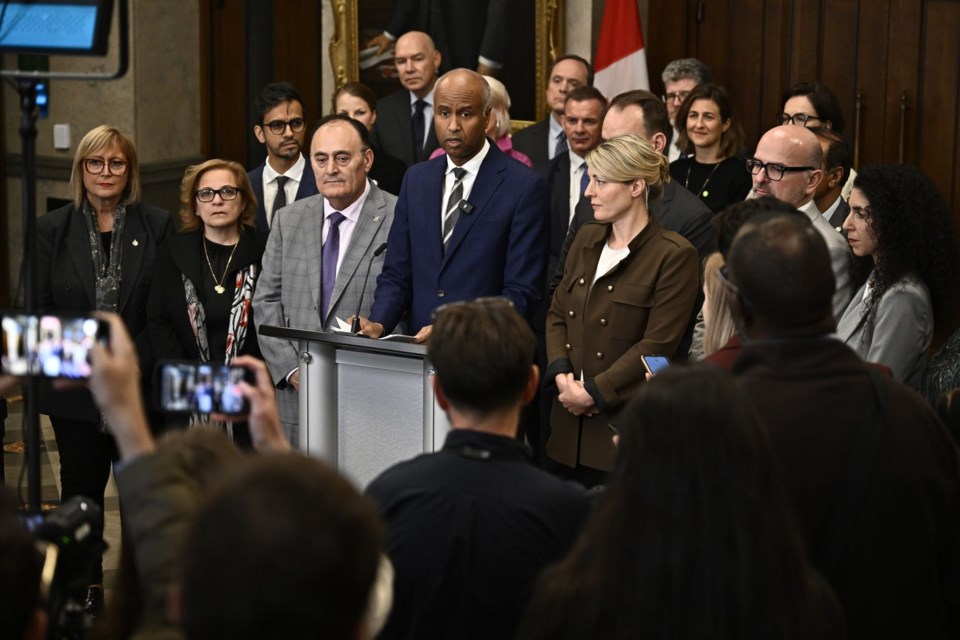OTTAWA ŌĆö sa╣·╝╩┤½├Į is adding another $15 million to its humanitarian aid package for Lebanon after an escalation in the conflict between Israel and the Lebanon-based militant group Hezbollah.
International Development Minister Ahmed Hussen says the new money will help Canadian and international aid groups provide food, water, emergency health care and other assistance in Lebanon, though the exact allocations are yet to be determined.
"This conflict is taking a terrible toll on civilians in Lebanon and beyond," Hussen said at a press conference on Wednesday.
"As of today, sa╣·╝╩┤½├Į has committed $25 million to support humanitarian response to assist the most vulnerable civilians in Lebanon."
The $15 million in new funding comes on top of $10 million in aid announced by Hussen at the end of September.
He said $6 million of the previously announced money will be split between the Red Cross and the Humanitarian Coalition, to match up to $3 million each in donations made to their individual Lebanon aid campaigns.
As well, $4 million will be split between the UN Refugee Agency and the World Food Program.
sa╣·╝╩┤½├Į is also sending relief items from its stockpiles, including 5,000 blankets and 1,000 hygiene kits.
Hussen said more than 2,000 people have been killed in Lebanon, including two Canadians, and thousands of civilians wounded. The conflict has put significant pressure on humanitarian organizations on the ground there, he said.
Food, medicine, shelter materials and emergency health care are urgently needed, said Hussen.
The Humanitarian Coalition urged Canadians to donate in a press release, saying donations sent between Sept. 24 and Nov. 3 will be eligible for matching from the government.
The coalition is made up of 12 of sa╣·╝╩┤½├Į's largest aid organizations.
"Many of our member organizations have been working in Lebanon for decades and are already providing life-saving essentials," said executive director Richard Morgan in the release.
"But the scale of this emergency is catastrophic. The humanitarian needs are massive."
The military escalation has led to mass displacement in Lebanon, with many people fleeing their homes without basic necessities, and is also taking a psychological toll, the coalition said.
It added that Lebanon's 978 shelters are almost full, with many displaced people sleeping outdoors and increasingly at risk as the weather gets colder.
Global Affairs sa╣·╝╩┤½├Į said Wednesday that so far it's helped almost 1,050 Canadians, permanent residents and their immediate family members to leave Lebanon. It says it has also helped about 250 people from other countries leave Lebanon.
The agency says itŌĆÖs now getting fewer than 100 new requests a day for information on departure options, and all eligible travellers have been offered departures, have left or can leave in the coming days.
On Monday and Tuesday, Global Affairs sa╣·╝╩┤½├Į says 205 people left Lebanon.
As of Oct. 8, there were more than 25,000 Canadians registered as being in Lebanon, but the government said the true number may be higher because registration is voluntary. Foreign Affairs Minister M├®lanie Joly has previously said there are an estimated 45,000 Canadians in the country.
On Wednesday Hussen reiterated calls for Canadians to leave Lebanon.
A spokesperson for Immigration Minister Marc Miller said right now the focus is on helping Canadian citizens and permanent residents, as well as their spouses in children, to get the documents they need to travel.
"Further, we are prioritizing the processing of certain types of family class permanent resident applications," said spokeswoman Ren├®e Proctor in an emailed statement.
This report by The Canadian Press was first published Oct. 9, 2024.
Rosa Saba, The Canadian Press



